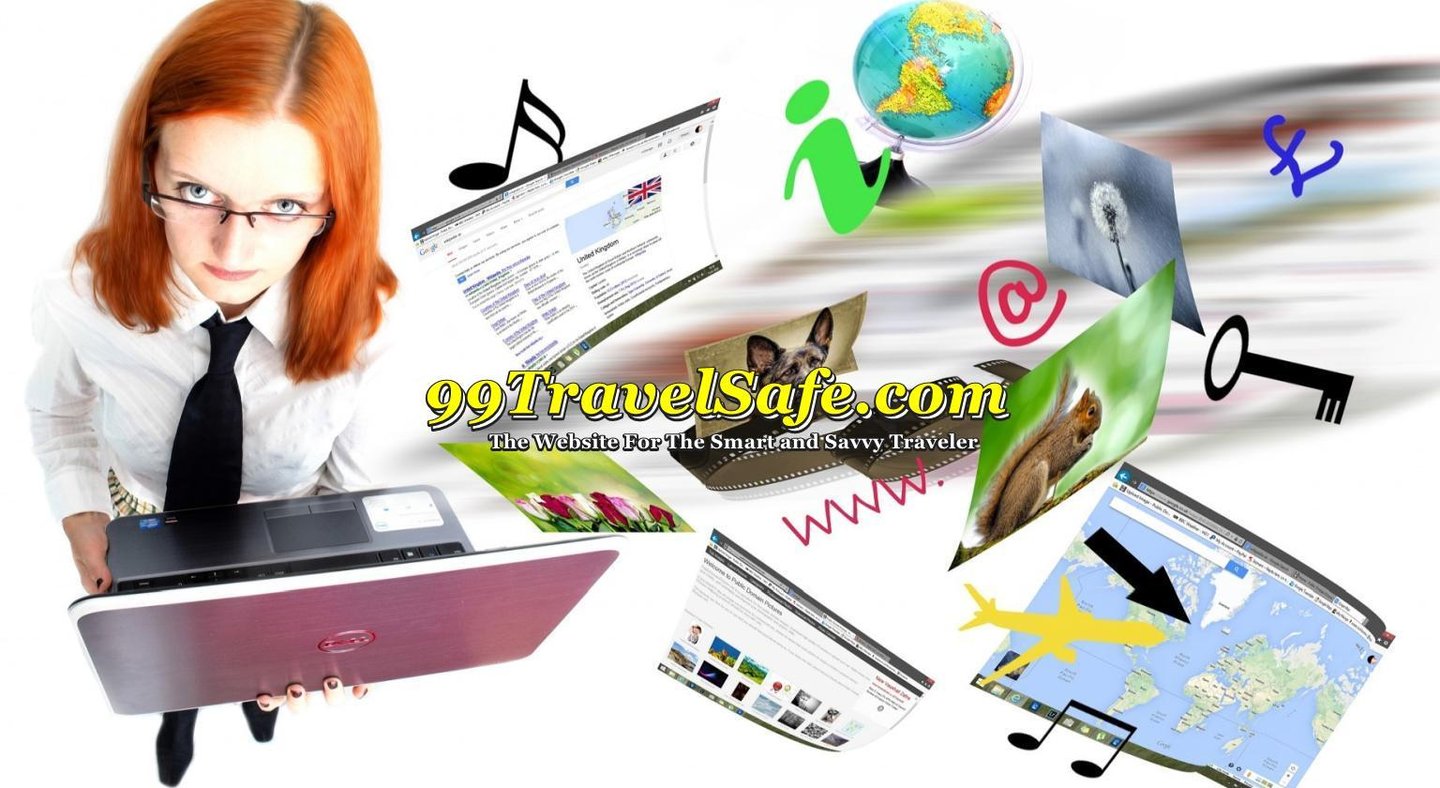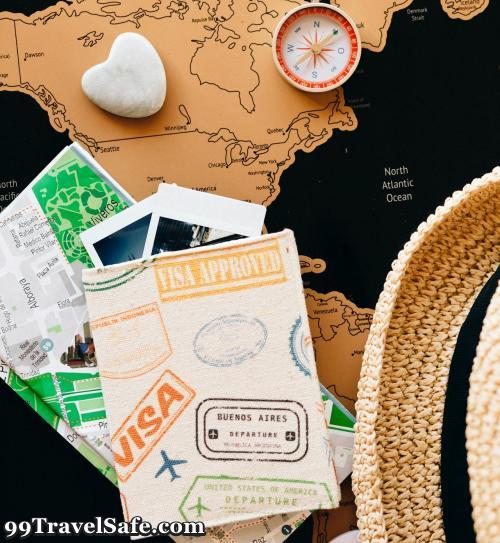

99TravelSafe.com
The Website For The Smart and Savvy Traveler
Getting Visas and Passing Through Customs and Immigration and Baggage Check!


Getting A Visa For Holidays
To get visas for your holiday, you generally need to apply online through the relevant country's embassy or consulate website. You'll need to fill out an application form, provide supporting documents like a passport, passport photos, proof of financial support, and travel itinerary. Some countries also require a letter of invitation or hotel booking confirmation.
What You Need To Do
Identify Required Visa Type
Tourist Visa
For leisure travel and sightseeing
Visitor Visa
Similar to a tourist visa, but may be used for visiting friends or family
Other Visa Types
Depending on the purpose of your trip, you might need a business visa, student visa, or other specialized visa
Gather Required Documents
Passport
Valid for at least six months beyond your intended stay
Passport-sized Photos
Make sure they meet the specific requirements of the country
Application Form
Fill out the online application form accurately
Proof of Funds
You must show you have sufficient money to support yourself during the trip
Travel Itinerary
Outline your planned travel dates and destination
Other Documents
Depending on the country, you may need a letter of invitation, hotel booking confirmations, or other specific documents
Submit Your Application
Online
Most countries now have online visa application systems
In Person
For some countries, you may need to submit your application in person at a visa application center or embassy
Pay the Visa Fee
The visa fee will vary depending on the country and the type of visa
Attend a Visa Interview (If Required)
Some countries require a visa interview to assess your application
Wait for the Visa Decision
The processing time for a visa can vary, so it's best to apply well in advance of your travel date
Collect Your Visa
Once your visa is approved, you will receive it either through the mail or at a designated location
Important Considerations
Visa Requirements Vary
Each country has its own specific requirements for visas, so it's important to check the website of the relevant embassy or consulate.
It is highly recommended to purchase travel insurance before you go.
Language
If you are visiting a country where you don't speak the local language, consider learning some basic phrases or having translation apps on your phone.
Be Aware of Any Travel Advisories or Warnings for Your Destination!
Passing Through Customs and Immigration
Fill Out Customs and Immigration Forms in Advance
Many countries are asking travelers to fill out customs declarations and immigration forms online instead of on paper. Canada, for instance, now requires inbound international travelers to use the ArriveCAN app to provide travel and public health information. The free CBP Mobile Passport app speeds your re-entry to the U.S. by submitting your passport and customs declaration information online.
Take a few minutes to research your country’s entry requirements before you travel. Look up your destination in the U.S. Department of State’s country information database. You can also check our interactive map for the latest information on travel requirements and entry restrictions for international destinations
The faster you can deplane and reach the passport control area, the fewer people will be ahead of you in line. This doesn’t mean you should shove other passengers out of the way, but you can speed up the process if you:
-- Use the restroom on the plane before disembarking
-- Choose a seat toward the front of the plane
-- Wear good walking shoes, especially if there’s a super-long trek from the arrival gate to the customs and immigration area (we’re talking about you, Toronto Pearson)
-- Keep all travel documents close at hand and organized, so you’re not searching for them in your suitcase
-- If you have a disability and/or mobility challenges and require assistance getting to and through customs, inform your airline before you travel. U.S. Customs and Border Protection asks travelers to inform a CBP officer of any special accommodations needed
Do Not Carry Food Items
A woman accidentally brought a Subway sandwich from Singapore to Australia and she forgot to declare it, and as a result she was fined $1,840. Don’t let this happen to you! Throw away any fresh fruit, vegetables or meat before you get to customs, either on the airplane or in a designated trash receptacle in the airport.
If you’re in the customs line and you realize you have a prohibited item with you, don’t try to conceal it. Ask the customs officer what you should do.
Know The Questions You Will Be Asked
Upon arriving in a foreign country, you can expect customs officers to ask you some or all of the following questions
What is the purpose of your trip?
Be honest and succinct, whether the answer is vacation, work, seeing friends and family, etc. The customs officer doesn’t need your life story.
How long do you intend to stay?
Know the date of your departure. If you’re staying for a long time (say, a month or more), you may be asked about your planned activities.2
Where will you be staying?
Have the exact address on hand. A vague answer, such as “with friends,” may raise red flags.
What is your occupation?
Give a clear, simple answer, because if you stumble you may be asked additional questions.
Do you have anything to declare?
Be aware of what items may be prohibited or controlled at your destination.
Upon your return to the United States (for US travelers), you may be asked more questions about the nature of your trip and anything you’re bringing back with you. One common question is, “Have you visited a farm?” Customs won't deny you re-entry to the country if you've visited a farm, but you may lose some time while they clean your footwear to make sure you're not accidentally bringing any biological contaminants into the country. Invasive species and illnesses are very real hazards. If you’ve visited any farms, admit it and accept the possible delay.
Retain Your Receipts
Each country allows you to transport a certain dollar amount of purchases across the border without paying duty, which is a tax levied on purchases made or gifts received while you're abroad. Keep your receipts and track how much you've spent. This way, you can prove whether you fall under the duty limit or how much you may be over the limit.
Don't Use Phone While Talking
Do not use phone while answering questions from customs and immigration officials. To have a quick and hassle-free experience, leave your phone and camera tucked away until you're all the way through customs.
Become a Trusted Traveler
Apply for the Global Entry program. You'll have to pay $100 and submit to a background check, and not every airport supports Global Entry. Nevertheless, if you're accepted into the program and traveling through a major airport, your trip through U.S. customs boils down to a quick stop at an automated kiosk to confirm your identity and make any necessary declarations. The NEXUS and SENTRI programs, also offered by the Department of Homeland Security, offer similar benefits when you’re entering Canada and Mexico.
Keep Your Cool
Travel is frustrating. Long waits in customs lines are even more frustrating. Add to that the indignity of having a customs agent rummage through your suitcase and ask you invasive questions, and you might be tempted to snap. Don’t! Take a deep breath. Remain calm and cordial. The ACLU has a handy guide that explains your rights when going through U.S. immigration and customs
Remember Travel Insurance may also help when international trips go bad! Call 24-7 assistance for help with translation, replacing lost or stolen travel documents, and more. Assistance is included with most plans—find the right protection for your next trip
Passing Through Baggage Check
Passing through a baggage check involves screening both carry-on and checked luggage at airport security checkpoints to ensure safety. Carry-on bags go through an X-ray machine, while checked luggage undergoes separate screening, potentially including a physical search if deemed necessary.
A More Detailed Breakdown
Carry-on Baggage
X-ray Scanning
Carry-on bags are typically scanned using X-ray machines to detect prohibited items and potential threats
Prohibited Items
You'll need to remove and place certain items like liquids in containers exceeding 100ml, electronic items, and sharp objects into the tray for scanning
Manual Inspection
If an item looks suspicious or if the scanner cannot clearly identify something, a security officer may conduct a manual inspection of your carry-on bag
Checked Baggage
X-ray Scanning
Checked baggage is also scanned using X-ray machines to detect potential hazards
Physical Inspection
If an item looks suspicious, security officials may perform a physical inspection of your checked baggage
Inspection Notice
If your checked bag is physically inspected, security officials will place an inspection notice inside the bag to inform you
Checked-through Baggage
If you have a connecting flight on the same airline ticket, your checked baggage may be checked through to your final destination, meaning you won't need to collect and recheck it at layovers.
Source: Google
